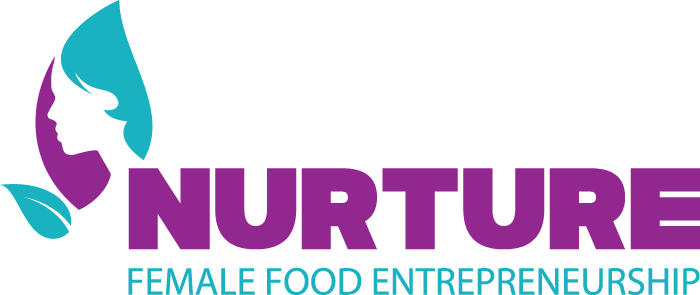Resources for
Female Entrepreneurs in Europe

GMIT Educate to Innovate Female Food Entrepreneurs Leaflet
You can find our official leaflet for review here.
OUTPUT 1
A Training Guide for VET providers on Delivering Work-Based Entrepreneurial Training to Female Food Entrepreneurs (FFEs) for the Agri-Food Sector.
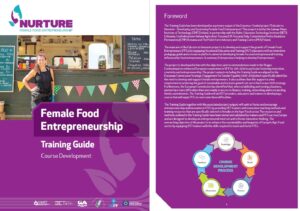
Digital Tools for VET Educators
This is a pdf document to supplement the IO1, training guide. Following COVID19 it has become increasing important for educators to have the ability to transition to online learning environments to reach and engage with their learners.
This supplement includes specific information on the most appropriate platforms, tools and methods for VET educators to implement, and increase their engagement with their learners in online environments.
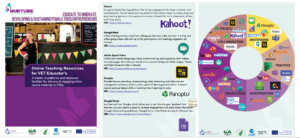
OUTPUT 2
An Online Resource Platform providing European Female Food Entrepreneurs with resources, training, advice and collaborative opportunities. It is essentially a ‘one-stop shop’ to help sustain the growth of females in the Agri-Food sector.
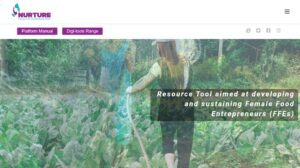
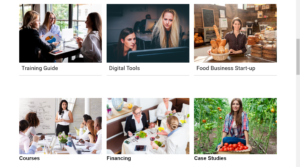
Female Food Entrepreneurs Panel 1 Discussions
Panel 1: A. Food truck experiences from the start-up, the expert and the pivoting Female Food Entrepreneur.
Panelists discuss how they have sustained, sparked and pivoted development during a pandemic have pivoted and grown their food businesses during a challenging 12 months in the Agri-Food sector.
Jacinta Dalton; Head of Dept. Culinary Arts & Service Industries, Galway International Hotel School) is the event MC in all the interactive discussions.
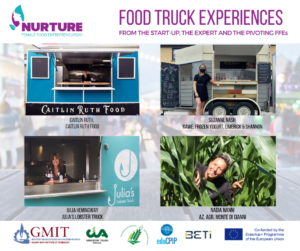
• Julia Hemingway – Julia’s Lobster Truck, Ireland
• Suzanne Nash – Rawe, Frozen Yogurt, Ireland
• Caitlin Ruth, Caitlin Ruth Food, Ireland
• Nadia Nanni, ‘Monte di Gianni’ farm, Italy
Thanks to the participation of the attendees and speakers this was a engaging virtual event for viewers to be inspired, learn new skills, network and make an impact together to sustain and support Female Food Entrepreneurs in the Agri-Food Sector throughout Europe.
If you do watch this video series please take the time to engage in the project outputs and share your honest feedback in the comments below or by email so we can create educational resources and more events like this in the future.
Female Food Entrepreneurs Panel 2 Discussions
Panel 2: How to build your online presence as a Female Food Entrepreneur.
Panelist experts discuss how they use online media marketing platforms to leverage and speak to their audience and provide and share tips and tricks with attendees on how they can do so too. Jacinta Dalton; Head of Dept. Culinary Arts & Service Industries, Galway International Hotel School) is the event MC in all the interactive discussions.
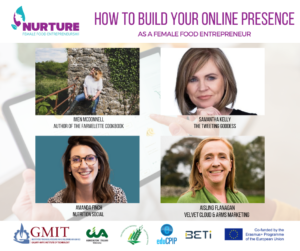
• Aisling Flanagan -Velvet Cloud and ARMS Marketing & Training)
• Amanda Finch – Nutrition Social, UK – Instagram Specific
• Samantha Kelly – Tweeting Goddess, Twitter & Social Media Strategist
• Imen McDonnell – Author, #TheFarmetteCookbook. Member@Foodguild
Female Food Entrepreneurs Panel 3 Discussions
Panel 3: Agri-Food Clusters in Female Entrepreneurship.
Panelists discussed how Clustering works in driving innovation in rural areas, to support female entrepreneurship and create sustainable routes in the Agri-Food sector.
Jacinta Dalton; Head of Dept. Culinary Arts & Service Industries, Galway International Hotel School) is the event MC in all the interactive discussions.
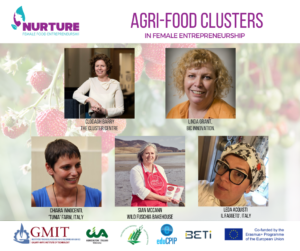
Speakers:
• Clodagh Barry, The Cluster Centre – Clusters and Why Cluster?
• Linda Grant, Programme Director for the Food & Drink Wales speaking about Sustainable Scale-Up Clusters.
• European Guests – Female Entrepreneurs
A. Siobhan McCann, Donegal (wildfuschia.ie)
B. Chiara Innocenti, ‘Tunia’ farm, Italy (chiara@tunia.it)
C. Leda Acquisti, ‘Il Faggeto’, Italy (leda.acquisti@gmail.com)
Creating Entrepreneurs in Food (CEF) Project
European Erasmus KA2+ funded project. Created to boost innovation and entrepreneurship in rural communities across Europe. The project is led by the project coordinator Galway-Mayo Institute of Technology, Ireland working in partnership with the University of Bedfordshire in the UK, CEJA in Belgium and the Polish Beef Association, Poland. It focuses on ‘Promoting work-based learning in all its forms, with special attention to apprenticeship-type training’.
The project aims to promote and support those involved in Short Food Supply Chains by providing them with entrepreneurial work based training and opportunities to connect, collaborate and knowledge share with other food producers.
The objective of the course is to provide the target group with the knowledge and work-based skills required to foster and develop their food ideas into successful businesses, encouraging graduates to consider food entrepreneurship as a viable alternative to employment.
CEF Web Portal
A dedicated web portal hosting an interactive forum will be designed as a Project Output which will serve as a support to existing and developing food entrepreneurs and those involved in short food supply chains. This will allow them to stay connected, boost innovation and stay up to date with current industry developments. The web portal will provide an online network for the industry and will be an opportunity for businesses to collaborate and overcome challenges facing the short food supply chain industry. The web portal is an all-in-one online support tool for food entrepreneurs.
> Official Website
Resources for
Female Entrepreneurs in Ireland

Going for Growth
This is a free, female-only programme was started by Paula Fitzsimons as a support network for female entrepreneurs. It is funded by Enterprise Ireland and KPMG. It offers monthly meetings with experienced female lead entrepreneurs, who offer a round-table mentoring service to small groups of female business owners. You will also get access to a national forum that gives early-stage female entrepreneurs the chance to network with leading entrepreneurs and build on the work of the roundtable sessions.
Acorns
This is an excellent programme for early-stage female entrepreneurs living in rural Ireland. Past participants report increased sales, exports and employment creation.
Female High Flyers
An accelerator programme for early-stage start-ups, specifically addressing the challenges facing female entrepreneurs. As well as receiving the usual top-flight tools, support and guidance – for which the DCU Ryan Academy is renowned – you will explore and understand the unique challenges facing women in business.
The Competitive Female Feasability Fund
Run by Enterprise Ireland, with the objective of helping female entrepreneurs investigate the viability of their business becoming a High Potential Start-up (HPSU). The maximum grant available is €25,000.
The Female Competitive Start Fund
Also run by Enterprise Ireland and aims to accelerate the growth of female-led businesses that have the potential to make an impression in global markets. The maximum support available is €50,000 for a 10% ordinary equity stake in the start-up. Businesses that are existing or potential clients of Enterprise Ireland’s High Potential Start-up department may apply. They must also be operating in the areas of manufacturing or internationally traded services, must be less than five years old and not have annual revenues of over €60,000. Full eligibility terms are listed on the website.
Resources for
Female Entrepreneurs in Romania

Ghidul antreprenorului [Entrepreneur’s Guide] (2010)
The Project Business Start-up (2009-2010) aims to increase entrepreneurial potential at the level of the Bucharest – Ilfov region through the development of the entrepreneurial culture and by improving the competitiveness and adaptability of potential entrepreneurs.
The objectives of the Business Start-up project are as follows:
- Improving entrepreneurial potential in the region;
- Presentation and awareness of existing opportunities at the level of the region;
- Developing practical skills and theoretical knowledge needed for entrepreneurship;
- Providing consultancy for business start-ups;
- Stimulate the design of feasible business plans.
The target group of the project consists of people who want it to start an independent entrepreneurial activity (regardless of age, gender, minority, social category) belonging to the Bucharest – Ilfov area. The target group includes the following categories:
- authorized individuals;
- employed persons (employees);
- inactive people;
- people looking for a job;
- people with disabilities;
- PhD students;
- registered unemployed;
- Roma people;
- students;
- unregistered unemployed.
The guide addresses all future entrepreneurs, regardless of gender.
Chapters:
- The Business Start-up Project
- Entrepreneurship as an alternative
- How to build a business
- Management and leadership
- The courage to start
- Project management
- Negotiation – Practical advice
- Entrepreneurial concepts – Basic notions
Competente comune mai multor ocupatii – Competente antreprenoriale [Competencies Common to Several Occupations – Entrepreneurial Competencies] (2011)
Start-up: a chance for the unemployed but also for the NE region (START-UP NE)
Project co-funded from the EUROPEAN SOCIAL FUND by: Sectoral Operational Program Human Resources Development 2007-2013
Priority Axis 5: Promoting active employment measures
Key area of intervention: 5.1 Development and implementation of active employment measures
The course-support addresses all future entrepreneurs, regardless of gender.
Chapters:
- Entrepreneurship in the economy and society of the north-East Region
- Defining the terms business, profit and entrepreneur
- The path to great brands
- Research prior to choosing a business
- Types of business start-up
- External environment as a supplier of basic information (legal and economic)
- Research – investigation
- Management and administration
- Human resources
- Publicity and branding
- Action plan
- Choosing the firm’s structure
- Business plan
Antreprenoriat pentru tinerii din mediul rural [Entrepreneurship for Rural Youth] (2014)
Delivered by the Ministry of Agriculture and Rural Development
Main target groups for consolidation entrepreneurship in the environment rural areas are: young people, women and small farmers holders of subsistence farms and semi-subsistence.
The document addresses all future entrepreneurs, regardless of gender.
Chapters:
- Rural entrepreneurship in the European Union
- What should the youth know to start up their own rural business
- Financing opportunities for young rural entrepreneurs through the new National Programme of Rural Development
- Stimulating youth’s entrepreneurial initiatives through incentives and national programmes
- Successful projects of young entrepreneurs funded through the National Programme of Rural Development 2007-2013
Curs Competente antreprenoriale [Entrepreneurial Competencies – A Course Support] (2015)
Sectoral Operational Programme “Development of Human Resources”
Project title: START for you!
Editor: Association Patronage of Young Entrepreneurs in Romania
The document addresses all future entrepreneurs, regardless of gender.
Chapters:
- Introduction to entrepreneurship
- Starting up a business
- Qualities required for an entrepreneur
- Elements of business start-up
- Financing a business
- Developing products / services
- Development strategy and business risks
- Business planning
Suport de curs – Antreprenoriat [Entrepreneurship – A Support Course] (2016)
It is an intellectual output of the project “A model of integrate services for rural and chid protection youth” (2015-2016). It aims at improving services for rural and chid protection youth for better social and professional integration through the promotion of a model of integrated services. Specifically, it aims at improving living abilities and labour market integration chances for 225 young beneficiaries, at increasing the capacity of the actors involved in providing services for the youth at local and county levels, as well as at developing local and county networks that meet the needs of youth from disadvantaged categories through the use of methodologies for professionals in the field.
The course support addresses all future entrepreneurs, regardless of gender.
Chapters
- Introduction to entrepreneurship. General notions
- Developing a business plan. Business plan – general structure
- Capital investments
- Legal issues. Starting up and administering a MME.
Ghid pentru Femeile Antreprenor în Fază de Start-Up şi pentru Comunităţile Lor [A Guide for Start-up Female / Women Entrepreneurs and Their Communities] (2018)
The EmpowerWOMENt project focuses on women in the early stages of their own businesses (2-3 years) and on the satisfaction of their needs.
The project aims to conceive and pilot entrepreneurial ecosystems in different countries partners and to develop case-based guidance for other European communities. The results of the EmpowerWOMENt project are a significant increase in sustainability for the start-up businesses of the women involved, the creation or consolidation of local or virtual support ecosystems and the development of guides or high-quality support materials for groups of women who run newly established businesses from all over Europe. Our goal is to develop the entrepreneurial skills and knowledge of women and to strengthen their identity, to encourage women to start on new roads, to work with different models and to achieve an ideal balance between family life and career priorities.
The guide was written with support from women active in goods production (clothing, company games, crafts, cutlery, embroidery, event materials, food products, foot ware, fruit and vegetable preserves, gadgets, jewellery, textiles, video games, wedding dresses) or services (accommodation, accounting, arts, business and change management coaching, business consultancy, catering, children care, consultancy in entrepreneurial legal and financial issues, consultancy in professional transitions, consultancy in sales, cooking workshops, counselling, cultural management, e-commerce, education, energy consultancy, events organisation, graphic design, hair care, health, local and national auctions, massage, nutrition consultancy, office services, open-air events, organisation and production, project management, restauration, skin care, social integration of women, social services, software, support for female / women entrepreneurs, tourism, translations, virtual assistance, web development, wedding planning, welfare, women care, yoga) fields.
The guide addresses particularly female / women entrepreneurs.
Chapters
- Introduction
- Starting up a business: maturing an idea and designing the entrepreneurial project
- Building up a strategy for firm launching
- Development of a product
- Communication
- Administering the firm
- Being one’s own boss – benefits and challenges
Manual Competente antreprenoriale [ A Handbook of Entrepreneurial Competencies] (2018)
Program Title: Human Capital Operational Program 2014-2020
Priority Axis 3 – Jobs for All
Specific objective 3.7 – Increasing employment by supporting companies with a non-agricultural profile in the urban area
Project Title: Sustainable Entrepreneurship in the North West Region
The handbook contains numerous specific references about female entrepreneurs.
Chapters:
- To be or not an entrepreneur
- Starting one’s own business
- Financing one’s own business
- Planning one’s business
- Marketing
- Managing the firm’s finances
- Strategic planning for a successful business
